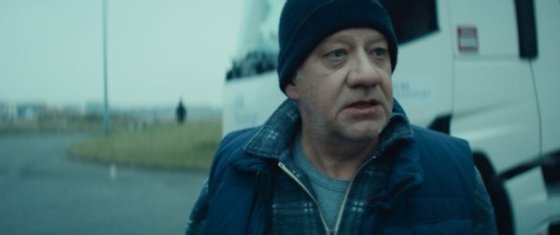Home > Reviews > Shorts > Leo Blandino on Bitume at the Brasserie
Leo Blandino on Bitume at the Brasserie
Monday 30 January 2023, by
On his way to England for an urgent transport, Merlin, an exhausted 50-years-old driver, begins to hear haunting voices from the back of his locked truck. An impressive mix of grit and poetry drives the miserable, heart-wrenching fate of migrant workers home. By encasing this in a more esoteric depiction of loneliness against the harsh lines of its looming background of trucks and highways, Leo avoids pathos and allows his film to resonate for a long time.
How did you happen to think of making a film about truck drivers?
I wrote the script with Thimothée Meyrieux-Drevet who shared his research on drivers and the evolution of their working conditions. I was immediately interested by the topic. So then we had to figure out how to talk about it and come up with a cinematic idea. For that, I was primarily inspired by the world of highways and industrial areas. They’re paradoxical places that are neither natural areas nor inhabited ones, where machines reign supreme. Trucks are almost like the animals of a mechanical biotope for the area. And drivers are solitary humans who pass each other, like sailors on the sea. That’s what I found fascinating about their job: over the course of their life, they drive more than they walk.
How did you meet Christophe Kourotchkine?
Choosing Christophe was both simple and instinctive. We didn’t cast for the role. The production team organized a meeting with him to go over the script. The moment I saw how he moved, talked, watched, I had no doubts about him for the part.
Were you more interested by the feeling of insignificance or by the question of breaking off relations with one’s family?
Aren’t those two issues linked? Doesn’t the feeling of insignificance depend on the relationship we have with others and with our environment? More than the question of breaking off, I think it’s the question of our “link” to the world and to others that spurred me.
Were you particularly interested in the subject of “undocumented” immigrants? Do you see yourself making other films on the topic?
I don’t know where that comes from, but it’s something that comes up often when I write. For example in my earlier film, Z.A.R (2021), a science-fiction film that talks about climatic migrations. Honestly, it’s unconscious on my part. I’m not particularly active politically, but I am ashamed. I’m ashamed of knowing and of adapting so easily to the situation sometimes, and to a certain degree, as a European of a certain social class, of taking advantage of the situation. So, since I’m ashamed, I display my shame wherever I find myself, which in this case means a heated apartment in a French city where you can order food that’s often cooked and/or delivered by migrant workers (who are sometimes undocumented), in precarious situations, who’ve lived through things that my mind and body could perhaps not even imagine.

What’s your favorite short?
With no hesitation, I have to say William Laboury’s Hotaru… It’s a science-fiction film that’s edited together using mainly archival images. For me, it’s both a narrative and formal wonder. It’s one of my favorite films, regardless of format. I’ve seen it at least ten times. I’ve never met the director, however, so I haven’t told him yet. If that happened, I’d probably buy him a pint of beer out of friendship. I was also very impressed with Amour(s) by Mathilde Chavanne, which I saw at Clermont-Ferrand in 2020. But I was able to tell her. And I did buy her a pint.
What does the Festival mean to you?
I’ve heard about the Festival since I was fourteen. Later on, I went often as an audience member, but this is the first time that I’ll be presenting my film in competition. So obviously, it’s a bit symbolic for me. It’s also a Festival where you can see a lot of films, very different ones from all over the world, and then go and argue with like-minded film-buffs in a bar about your favorite ones and least favorite ones. Which, along with eating truffade, is one of my favorite activities in Clermont-Ferrand. That way of appreciating films is not necessarily universal, but for me, the critical disagreement the Festival encourages is what makes up the entire vitality of cinema. I sincerely hope people will viscerally loathe my film and passionately argue with other people who might have loved it.